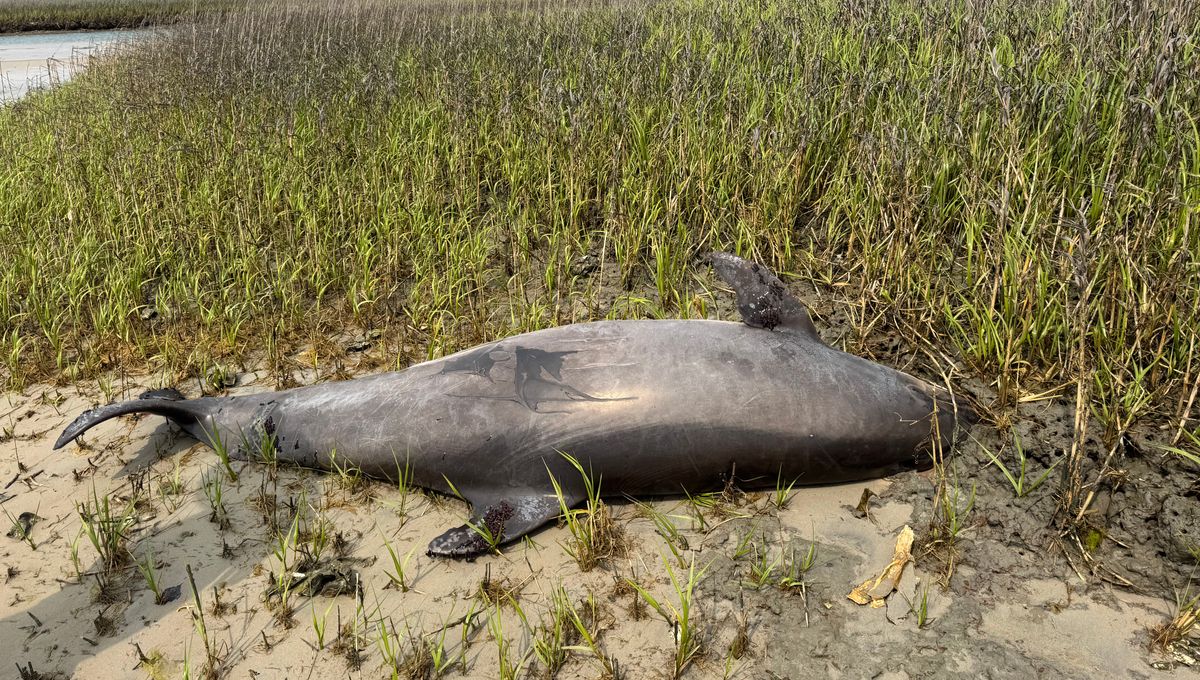
There’s been a murder most foul – or, should we say, most marine-mammalian – in North Carolina: a bottlenose dolphin, found dead and decapitated last month on the state’s Lea-Hutaff Island. Worse still? It was sick – and whoever took the head may be at risk.
A headless dolphin, lying dead on the shore, makes for a gruesome image – but it’s also a misleading one. The animal appears to have been decapitated after its death, which came instead as a result of… well, they’re not exactly sure yet. Certainly, it was dead by April 15, when a member of the public reported its stranding on Lea Island, a remote and undeveloped barrier island north of Wilmington – but by the time Investigators made it to the spot, its head had already been removed.
“Our stranding network partner, University of North Carolina at Wilmington […] determined that someone intentionally removed its head between April 16 and April 18,” NOAA Fisheries Office of Law Enforcement reported, “after they received the initial stranding report.”
While the University has performed a necropsy – an animal autopsy – of the body, full results and cause of death are yet to be made public. One thing is known, however: the dolphin seems to have been carrying the bacteria Brucella.
Come into contact with that bacterium, and you’re likely to contract an infectious disease called Brucellosis. It’s most often acquired by drinking unpasteurized milk, but it can also be picked up from contact with an infected animal, or even just breathing the air near the wrong cow or caribou.
Brucellosis isn’t nice: it can cause a whole bunch of vague, feeling-kinda-crappy-but-I-probably-don’t-need-a-doctor kind of symptoms, and as such it can sometimes hang around for a long time before you think to seek medical attention. Generally, you’re going to see fevers, malaise (that is, just feeling generally bad), loss of appetite, headaches, fatigue, pain in your joints, memory loss and confusion, swelling in places like your liver, spleen, and testicles… you get the picture. It can even cause heart infections and inflammation, which, in extreme cases, can be fatal.
Of course, 99 times out of 100, it’s not deadly – but neither is it pleasant, which is why those who contract the disease should get their hands on some antibiotics, asap. If, for example, they happen to have recently come into contact with the grisly head of a dead cetacean.
That said, they may want to look out when they’re at the clinic. “This animal was intentionally decapitated,” NOAA says, which is a violation of the Marine Mammal Protection Act. As such, they are asking the public for any information about who may have been involved in the decapitation of the dolphin – the perp might be facing up to $100,000 in fines or a year in prison for the deed.
If you do happen to know anybody who has recently come into possession of a bottlenose and various other features, by the way, then it’s worth your while ratting them out: NOAA is offering a reward of up to $20,000 cash for any information that might lead to a conviction or civil penalty.
“Anyone with information about this incident should call the NOAA Enforcement Hotline at (800) 853-1964,” the agency notes. “You can leave tips anonymously, but to be eligible for the reward you must include your name and contact information.”
Source Link: Decapitated Dolphin Found On Remote US Island - And NOAA Wants To Know Who's To Blame